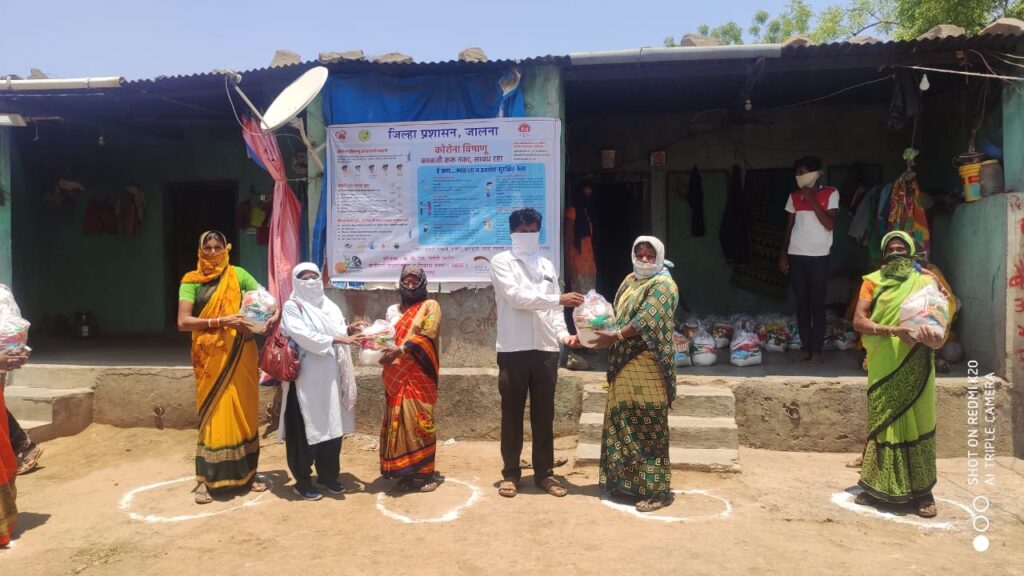
Grocery kits are given to poor and needy families by observing all the norms in Jalna Project
- Phone:+1 (859) 254-6589
- Email:info@example.com
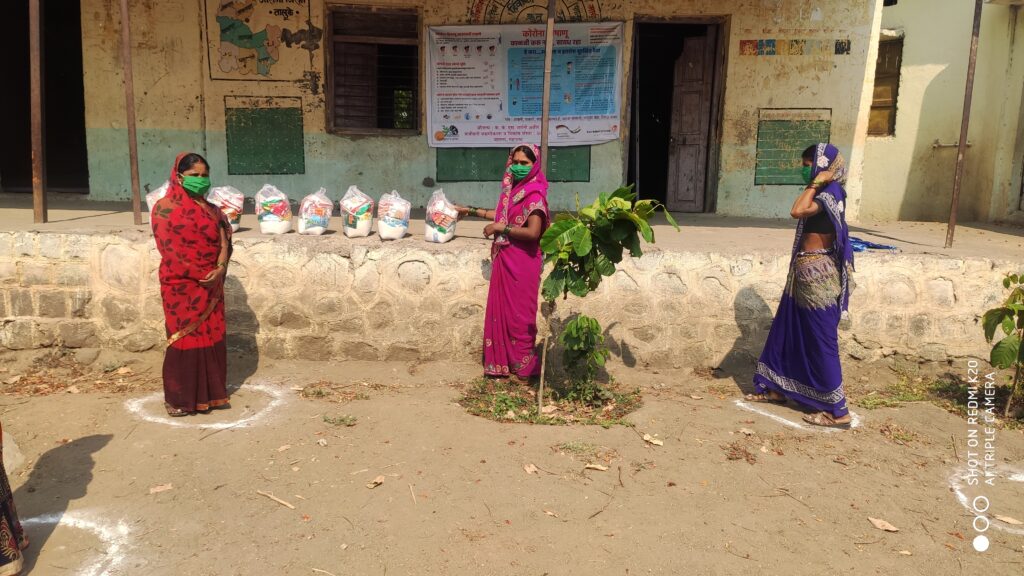
Women maintaining social Distance during receiving the grocery
- Phone:+1 (859) 254-6589
- Email:info@example.com
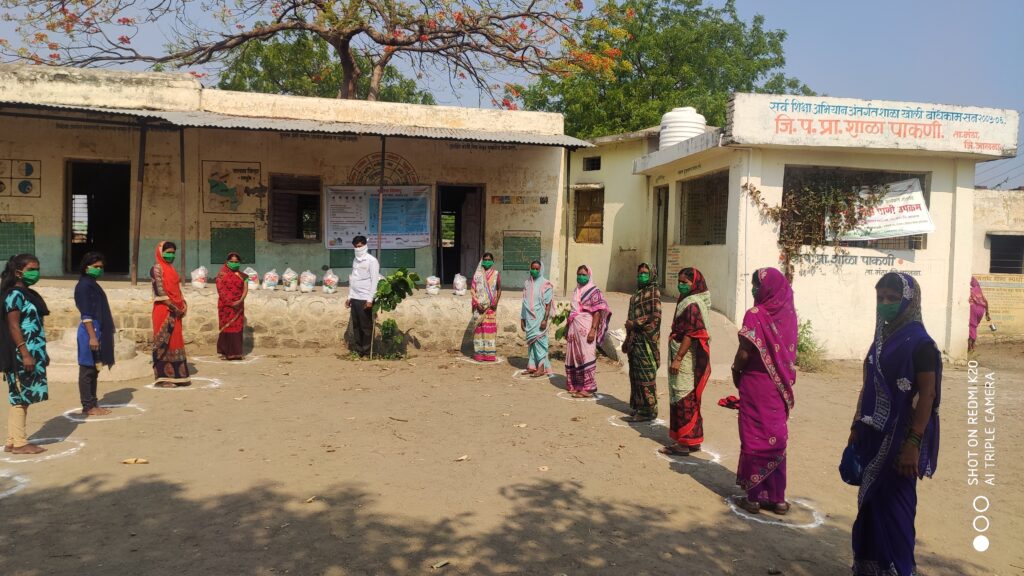
Social Distancing during grocery kit distribution in Pakani village
- Phone:+1 (859) 254-6589
- Email:info@example.com
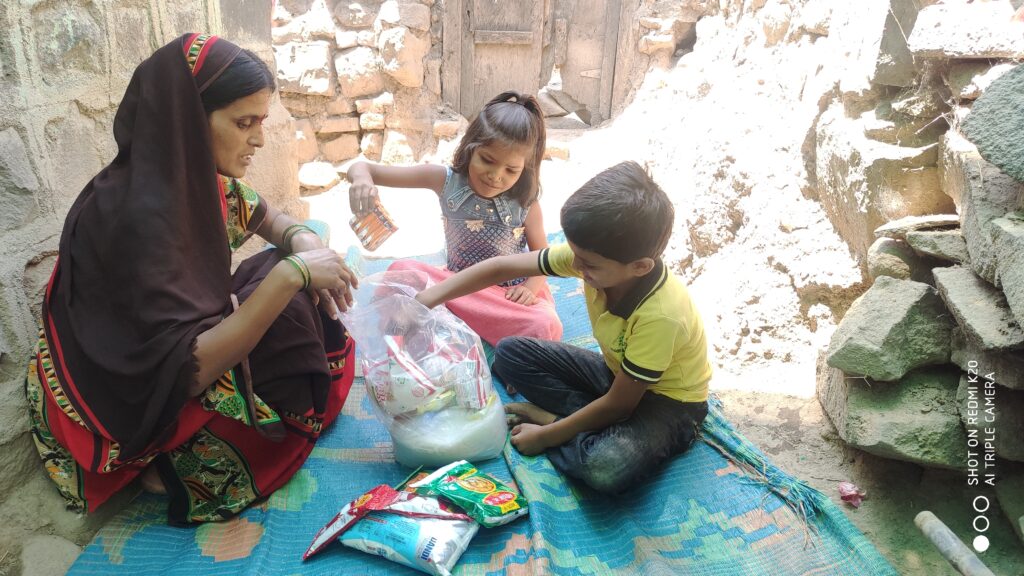
Rani Ganpat Kharvane with her kids after having received the grocery kit
- Phone:+1 (859) 254-6589
- Email:info@example.com
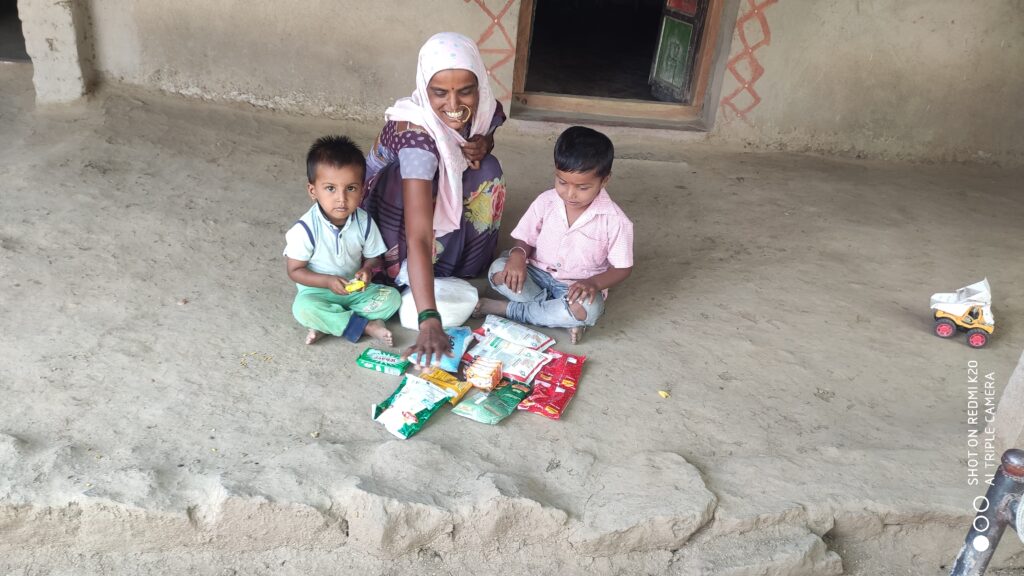
Laxmibai Tukaram Jadhav of Akani Village with her kids after having received grocery kit
- Phone:+1 (859) 254-6589
- Email:info@example.com
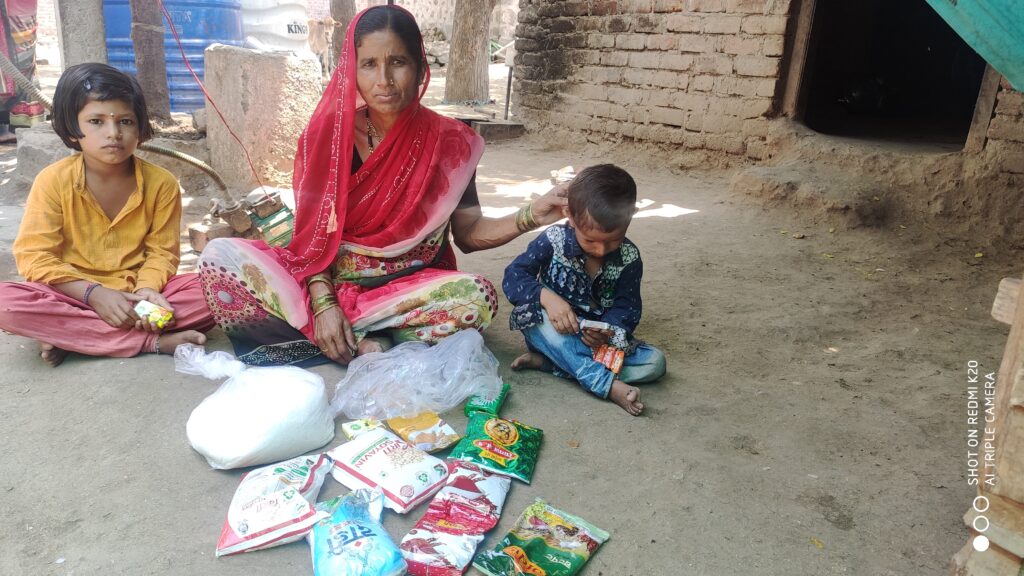
Bebabai Lachand Rathod with her kids after having received the grocery kit
- Phone:+1 (859) 254-6589
- Email:info@example.com
Background-:
KKS Germany supported project titled “Integrated Community Development by way of Regeneration of the Natural Resource base through Participatory Watershed Development in Jalna district, Maharashtra, India” is being implemented since 2017 in 5 drought affected villages of Mantha block in Jalna District. The project, as of now, has delivered on its plan significantly by way of regeneration of natural resources like land and water as major basic resources forming the base of the agrarian rural economy in project villages. The built capacity of the project community in general and that of CBOs, women, farmers, children, SHGs, entrepreneurs, in particular has placed these project village communities in a much advantageous position as compared to other adjoining non project villages. This has been clearly noticed during the COVID-19 situation and the subsequent lockdown period. In a way all these project stakeholders/beneficiaries together has quickly reconfigured in response to deal with the COVID-19 pandemic at local level. The project team initially led the effort which acted as a catalytic effect and this effort was later taken over by the respective village communities and grampanchyats.
The following part of the case study states how the project and the project outputs have helped in a significant way to the project community during the COVID-19 project period.
Communities Equipped to Deal with Eventualities
During the project period, one of the major components is community mobilization for the cause of development. The mutual trust building and the bonding of the community with the project team is very strong. During the COVID-19 Pandemic the project team continued engagement with the community and passed on the crucial information of the with regard to corona transmission, social distancing, use of mask, frequent hand washing and maintain the immunity. As precautionary measures, SIED Project Team, enhanced the level of awareness with regard to the COVID-19. Community is advised to stay at home during nationwide lockdown, go out only when it’s absolutely necessary, wash hands every time they come back from outside for a minimum of 20 seconds with hand wash or any soap, strictly maintain social distancing, when symptoms are seen, approach doctors immediately, take care of the old persons in the village etc. Volunteers have helped the community and grampanchaya in grain distribution undertaken by the government to the poor families. These mobilization efforts have positive results. Community members are following all the instructions by the relevant authorities and are strictly observing the social distancing.
One thing which has come out very clearly during this period is school children played an important role in explaining to the parent the way to wash hands with the hand wash. During the normal days the WASH activity was organized in which school student were given practical sessions and inputs on hygiene and cleanliness. In this the use of hand wash and washing hands daily twice/thrice was covered. This has helped a lot during COVID-19 pandemic situation not only to the student but through them to their families also. School children were showing the practical of how to wash hands to their parents and all the family members. School students were very happy that they are applying what they have learnt. This way they also used time they had due to lockdown. Women were given inputs during SHG meetings about health, hygiene and sanitation. Specific inputs were also given to women during this COVID-19 Pandemic period. So, children and women were leading in the efforts at the family front during this period.
Achieved Food Security
Agriculture development by way of watershed development has been at the core of the project intended to achieve the food and fodder security. The farm bunding treatment helped to conserve soil moisture in the farm itself. The inputs of cropping patters, seed treatments, organic farming, irrigation water management, vegetable cultivation and on diversified cropping pattern has helped in a lot. The families in the villages have grain production enough for their annual use and as such are having the food security. The vegetable production for is enough local consumption. During the COVID-19 Pandemic related lock down there was no stress among the village communities about the food securities. Grain storage and local vegetable production was sufficient to take care of the local consumption needs.
Assured Water Availability
In general and based on the previous data of the pre project period, families had to struggle to deal with the water scarcity from February onwards almost every year. Since last three years KKS supported project delivered on the area treatment and drainage line treatment as per the plan. The completed watershed treatments Water Absorption Trenches (WAT), Continuous Contour Trenches (CCT), stone bunds, gully plugs, loose boulders, gabions, nalla bunds, check dams, farm bunding have played a crucial and expected role in arresting, stopping and conserving the rain water throughout the rainy season. Although last year rainfall was less than average but whatever we had, has been completely conserved. Nearby wells got recharged and had the enough water for drinking. Some wells even had the first time water during this part of the year which was a pleasant surprise to farmers and the communities. So what is more important is that during the COVID-19 Pandemic lock down period, the community was not needed to go out in search of the water for the domestic use as usual. This was a great relief during such a period. Water was sufficiently available in the village itself.
Livelihood Interventions- Catering village needs
The livelihood interventions undertaken based on the local needs and the scope has proven to be the very important during the COVID-19 related lockdown. The lockdown restrictions have completely stopped the mobility. Grocery shops played a very important role in making the grocery items available even during the lockdown in the village itself. Here families could easily get the soaps and small bottles of hand wash which was very useful during this period. Computer center was helping the community with the online application, financial transactions, exam applications for students etc. The sewing machines were fulfilling the urgent stitching needs which otherwise needed a travel in pre project situation. The poultry, rabbit and goat rearing livelihood interventions served in terms meat, milk and eggs for the local consumption without any interruption.
Timely Work to Ensure Resumption of Cash Flow
During this COVID-19 Pandemic lock down period, poor families who were dependent on the agriculture work has faced difficulties of the shortage of cash flow. As this period was long this problem was addressed by to ways. As an immediate relief we have helped all these families by providing them the grocery kit for the ready use. To help then in terms of the availability of the cash, a field work from the project in accordance with the sanctioned plan is started in the project villages following the required procedure with the local authorities. On completion of the work as per the pan the timely wage payment is made. This resulted in the availability of the cash for the neediest and the poor families. This was like a two prong strategic plan to deal with the issue which has led to the envisaged result. These families now could take care of their own needs. The beginning of the agriculture work would take care of their further cash needs. Some of the poor families are already out of this situation as they have the help of the livelihood interventions to increase their income.
Project Team- A Catalyst
Having seen the work that was being done by the project team even during the period of corona risk, the grampanchyat and the local community leaders also swung into action and started working for the village. The local village staff helped the grampanchyat in village disinfection process. They also helped the government official in awareness, information transfer etc. The block level administrative officials praised the work done by the project team in these 5 project villages. This was a proud moment for us.
Concluding Words
Project communities are positioned in advantageous positions when compared to other adjoining non project villages. This is realized very clearly during COVID-19 Pandemic. The major factor leading to this difference is the project being implemented and the outputs delivered by the project both in soft and in hard in these villages. During this COVID-19 period, the reconfigurable network of the project stakeholders has been in a position to deal with COVID-19 and similar eventualities even in future. Regenerated natural resources, developing agriculture towards more adaptive to the need of the community, communities with built capacities, networking with the agriculture research and information center, enthusiastic farming groups and leading role playing CBOs are the building blocks of these reshaping project communities.
It’s not that the COVID-19 Pandemic is over for these villages, but the point to note here is that these communities are likely to deal with it more effectively as compared to other villages.
